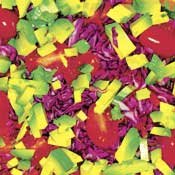A good salad can go far beyond the traditional iceberg-lettuce blend. You can mix together almost anything you have in your fridge and end up with a treat. Sometimes, however, unhealthy, fatty dressings and toppings can find its way into a bowl. Here are a few ingredients to keep your salad healthy but interesting.
• Salsa is a great alternative to salad dressing. A hearty salsa has less sodium than some dressings and no added fats. It adds pizzazz to your salad with its flavors, yet remains a healthy topping made with vegetables and fruits.
• Yogurt and honey, lemon juice, olive oil or vinegar can also substitute the traditional dressing and is healthier than ranch or other calorically high dressings.
• Tuna is a great addition because it is low in fat, contains omega-3 fatty acids and is high in protein.
• Whole-wheat couscous, barley, wheat germ or quinoa adds fiber, protein and a grainy texture to your salad.
• Beans add different color and mood to your salad while providing nutritional value.
• Seeds add a delicious crunch with every bite. Though nuts are similar, you get more seeds in a tablespoon serving and seeds have more zinc. Pumpkin seeds are high in iron. Sunflower seeds are great for vitamin E.
• Citrus fruit like oranges or grapefruit bring a tangy flavor to salads without being high in calories. Pineapples bring an exotic taste to your bowl of greens.
• Artichokes add an unusual taste to your plate but fits right in with its low-carb and low-calorie qualities.
• Applesauce, known more as a snack, can top off your salad without the fats and cholesterol
• Homemade croutons made from garlic-flavored whole wheat bread are definitely better than boxed croutons or crackers that can have a lot of hidden fat.


